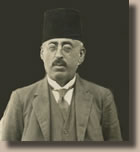APPENDIX 2
EMIR SHAKIB ARSLAN
Emir Shakib Arslan (Abou Ghaleb) (1869? - 1946) and Eltaher were very close to each other. It would be no exaggeration to say that Eltaher looked up to the older Emir in many aspects. Emir Shakib Arlsan was a well-groomed, prominent Lebanese notable and one of the princes of the Druze community, who played an important role in Lebanon’s and Syria’s political life. His family continues to play that role nowadays through his grandson Waleed Jumblat, who is presently considered to be the dean of the Druze community in Lebanon.
Emir Shakib equally played an important, multilateral role in an attempt to bring together the Arabs in general and the Muslims in particular to take a unified stand versus foreign colonialism which drained their countries and peoples. Without delving into the religious aspects of Islam, he looked at it as a socio-political factor that could help unite these people around a common goal.
Had he not been from a prominent family at a reasonable level of wealth, and had he not earned credibility with the Ottomans, he may have not been able to play the nationalist role he created for himself.
In 1908 Emir Shakib was Deputy Governor, “Qaem-Maqam”, of the Shouf region in Lebanon, then deputy for Horan (in Syria) in the Ottoman Parliament. He also played a major political role during the years of exile in Switzerland imposed on him by France, especially through his strong connections to the modern rulers of Turkey close to the end of the Ottoman Empire, namely Enver Pasha, Talaat Pasha, Jemal Pasha and Mustafa Kemal Atatürk. He also maintained strong contacts with senior German officials between the two World Wars, as well as with the nationalist movements in the Mashreq and Maghreb countries. Emir Shakib and his wife Salima El-Khass, who was Circassian, had a son, Ghaleb, and two daughters, Nazimah and May (mother of Waleed Jumblat).
To learn more about the role played by Emir Shakib, readers are encouraged to consult the following books, beside the book written by Eltaher himself, namely “Zikra Al-Amir Shakib Arslan” “In Memory of Emir Shakib Arslan”:
- “Amir Al-Bayan Shakib Arslan”, i.e. “Emir Shakib Arslan: The Prince of Eloquence”
by Sheikh Ahmad El-Sharabassi, Cairo 1963.
- “New episodes in Moroccan nationalism under colonial rule: reconsideration of Shakib Arslan’s centrality in light of unpublished materials”, by Dr. Umar Ryad, The Journal of North African Studies, Vol. 16, No. 1, March 2011, 117–142.
- “Islam against the West: Shakib Arslan and the Campaign for Islamic Nationalism”
By William L. Cleveland, University of Texas Press, Austin, Texas 1985.
(The first part of the title, namely “Islam against the West” is unfortunate and misleading to say the least. Neither Islam, nor Emir Shakib are against the West, and the contents of the book do not reflect this assertion. It is possible that that particular expression was added to the title to make this otherwise good book more marketable in North America.).

